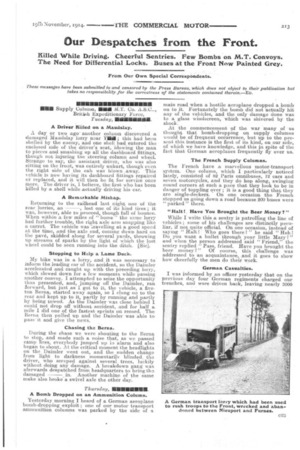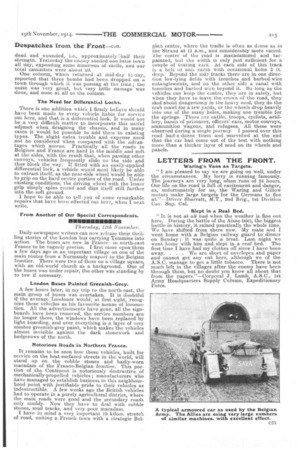Our Despatches from the Front.
Page 7

Page 9

If you've noticed an error in this article please click here to report it so we can fix it.
Killed While Driving. Cheerful Sentries. Few Bombs on M.T. Convoys. The Need for Differential Locks. Buses at the Front Now Painted Grey.
From Our Own Special Correspondents.
These messages have been submitted to and censored by the Press Bureau, which does not object to their publicaiion but takes no responsibility for the correctness of the statements contained therein.—ED.
ina11 Supply Column, MN M.T. Co. AO.., British Expeditionary Force, Tuesday, 111111•1111111111111111.
A Driver Killed on a Maudslay.
A day or two ago another column discovered a damaged Maudslay lorry near Yd; this had been shelled by the enemy, and one shell had entered tho enclosed side of the driver's seat, blowing the man to pieces and smashing up all the dashboard fittings, though not injuring the steering column and wheel. Strange to say, the assistant driver, who was also sitting on the front, was entirely unhurt, though even the right side of the cab was blown -away. This vehicle is now having its dashboard fittings repaired or replaced, and it will then be fit for service once more. The driver is, I believe, the first who has been killed by a shell while actually driving his car.
A Remarkable Mishap.
Returning to the railhead last night one of the rear lorries, an , lost one of its hind tires ; it was, however, able to proceed, though full of bounce. When within a few miles of "home " the same lorry had further trouble, the right axle arm snapping like a carrot. The vehicle was -.ravelling at a good speed at the time, and the axle end, coming down hard on the pave, skidded along for several yards throwing up streams of sparks by the light of which the lost wheel could be seen running into the ditch. [Sic].
Stopping to Help a Lame Duck.
My bike was in a lorry, and it was necessary to inform the leading car of the accident, so the Daimler accelerated and caught up with the preceding lorry, which slowed down for a few moments while passing another convoy. I attempted to seize the opportunity thus presented, and, jumping off the Daimler, ran forward, but just as 1 got to it, the vehicle, a fiveton Berna, started away again, so I clung on to the rear and kept up to it, partly by running and partly by being towed. As the Daimler was close behind I could not drop off without accident, and for half a mile I did one of the fastest sprints on record. The Berna then pulled up and the Daimler was able to passit and give the news.
Chasing the Berna.
During the chase we were shouting to the Berna to stop, and made such a noise that, as we passed camp fires, everybody jumped up in alarm and also began to shout.. At the critical moment the headlights on the Daimler went out, and the sudden change from light to darkness momentarily blinded, the driver, who scraped against several trees, luckily without doing any damage. A breakdown gang was aferwards despatehed from headquarters to bring the damaged ,in. Another machine of the same make also broke' a swivel axle the other day.
Thursday, 111111111111111.11. A Bomb Dropped on an Ammunition Column.
Yesterday morning I heard of a German aeroplane bomb-dropping exploit ; one of our motor transport ammunition columns was parked by the side of a main road when a hostile aeroplane dropped a bomb on to it. Fortunately the bomb did not 'actually hit any of the vehicles, and the only damage done was to a glass windscreen, which was shivered by the shock.
At the commencement of the war many of • us thought that bomb-dropping on supply columns would be of frequent occurrence, but up to the present this instance is the first of its kind, on our side, of which we have knowledge, and this in spite of the fact that German aeroplanes frequently fly over us.
The French Supply Columns.
The French have a marvellous motor-transport system. One column, which I particularly noticed lately, consisted of 82 Paris omnibuses, 12 cars and seven motorcycles, and they do hop along, swinging round corners at such a pace that they look to be in danger of toppling over ; it is a good thing that they are single-deckers. On one occasion the French stopped us going down a road because 200 buses were "parked" there.
"Halt! Have You Brought the Beer Money?"
While I write this a sentry is patrolling the line of vehicles; some of his challenges are distinctly peculiar, if not quite official. On one occasion, instead of saying "Halt! Who goes there? " he said " Heh ! Do you want a bullet through your little Mary'?" and when the person addressed said "Friend," the sentry replied "Pass, friend. Have you brought the beer money?" Of course, this challenge was addressed to -an acquaintance, and it goes to show how cheerfully the men do their work.
German Casualties.
I was informed by an officer yesterday that on the previous day four German regiments charged our trenches, and were driven back, leaving nearly 3000 dead and wounded, i.e., .approxima.tely■'half their strength. Yesterday the enemy sneneci one little town all day, expending some hundreds of shells, and our total casualties were about O.
One column, which returned at mid-day to-day, reported that three bombs had been dropped on a town through which it was passing at the time ; the noise was very great, but very little damage was done, and none at all to the column.
The Need for Differential Locks.
There is one addition which I firmly believe should have been made to every vehicle liable for service out here, and that is a differential lock. It would not be a very difficult matter to incorporate this useful adjunct when designing the chassis, and in many cases it would be possible to add them to existing types. The slight extra trouble and expense need not be considered when compared with the advantages which accrue. Practically all the roads in Belgium and France are hard in the middle and soft at the sides, with the result that, when passing other convoys, vehicles frequently slide to the side and thus block the way. If fitted with an easily-applied differential lock, a vehicle would most likely be able to extract itself, as the near-side wheel would be able to grip on the hard centre portion of the road. Under existing conditions, the driving wheel with the lesser grip simply spins round and digs itself still further into the soft ground. I hope to be able to tell you of some remarkable repairs that have been effected out here, when I next write.
From Another of Our Special Correspondents.
11111111111111•111111MINN :Thursday, 12th November.
Daily-newspaper writers can now release their thrilling stories of the London bus carrying Tommies into action. The buses are now in France—in north-east France to be vaguely precise. I first came upon them a few days ago in an important village on one of the main routes from a Normandy seaport to the Belgian frontier. There were two of them on a village square, with an old-world church as a background. One of the buses was under repair, the other was standing by to tow if necessary.
London Buses Painted Greenish-Grey.
A few hours later, in my trip to the north-east, the main group of buses was overtaken. It is doubtful if the average Londoner would, at first sight, recognize these vehicles as his favourite means of locomotion. All the advertisements have gone, all the signboards have been removed, the service numbers are no longer there, the windows have been replaced by light boarding, and over everything is a layer of very sombre greenish-grey paint, which makes the vehicles almost invisible against the dark stonework and hedgerows of the north.
Notorious Roads in Northern France.
It remains to be seen how these vehicles, built for service on the best-surfaced streets in the world, will stand up on the cobble stones and badly-worn macadam of the Franco-Belgian frontier. This portion of the Continent is notoriously destructive of mechanically-propelled vehicles; manufacturers who have managed to establish business in this neighbourhood point with justifiable pride to their vehicles as indestructible. A few weeks ago the British vehicles had to operate in a purely agricultural district, where the main roads were good and the secondary roads only muddy. Now they have to deal with cobble stones, mud tracks, and very poor macadam. I have in mind a very important 19 kilom. stretch of road, uniting a French town with a strategic Bel (den centre, where the traffic is often as dense as in the Strand at 11 a.m., and considerably more varied. The centre of the road is macadamized and tarpainted, but the width is only just sufficient for a couple of touring cats. At each side of this track is a belt of sots .earth with occasional holes 2 it. deep. Beyond the side tracks there are in one direction low-lying fields with trenches and barbed-wire entanglements, and on the other side a canal with trenches and barbed wire beyond it. So long as the vehicles can keep the centre, they are in safety, but when they have to leave the crown of the road, they skid about dangerousiy in the heavy mud, they do the crab crawl for a iew yards, or the wheels drop heavily into one of the many holes, making one tremble for the springs. There are cattle, troops, cyclists, artillery, banns of prisoners, officers' cars, motor convoys, ammunition wagons, and refugees. All these were observed during a single journey. I passed over this road half-a-dozen times and marvelled at, the end that the car had come out of the test with nothing more than a thicker layer of mud on its wheels and panels.
LETTERS FROM THE FRONT.
Waring's Vans as Targets.
"I am pleased to say we are going on well, under the circumstances. My lorry is running famously. The journeys are very long, often runs of 24 hours. Our life on the road is full of excitement and danger, as, unfortunately for us, the Waring and Gillow motors make large targets for the Germans to fire at."--Driver Sharratt, 1VI.T., 2nd Brig., 1st Division Cav. Sup. Ceil.
Slept in a Real Bed. .
"It is not at alit bad shen the weather is fine out here. During the battle of the Aisne (sic), the biggest battle in history, it rained practically the whole time. We have shifted from there now. My mate and I went home with a Belgian railway guard to dinner on Sunday ; it was quite a treat. Last night we went home with him and slept in a real bed. The first time I have had my clothes off since I have been away. . . . We are short of envelopes and paper and cannot get any out here, although we of the A.S.C. manage to get a little tobacco. There is not much left in the villages after the enemy have been through them, but no doubt you know all about that from the papers."—Corporal J. Lamb, A.S.C., 1st Army Headquarters Supply Column, Expeditionary Force..




















